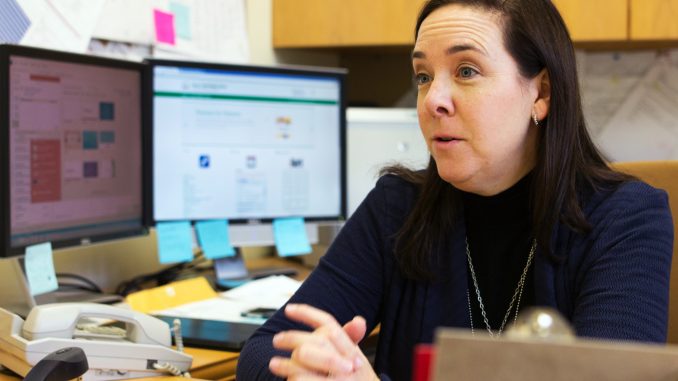
The office is filled with mounds of neatly stacked binders and papers. Reports need to be completed, surveys finalized, and progress needs to be made. Nothing about the stacks makes the spacious office appear small, but they serve as a reminder to the amount of work that needs to be done.
Sitting behind the L-shaped desk in one corner of the office, which is nearly filled with more binders and reports except for a small rectangle used for meetings, is Dr. Jodi Levine Laufgraben. As usual, she is quite busy.
Laufgraben said her career at Temple started in a rather unexpected way.
Her family had just moved to southern New Jersey and she was looking to join them from New York, where she was working for the State University of New York’s Farmingdale campus doing admissions.
Upon the move to New Jersey, her mother saw a job description for an academic advising position at Ambler Campus.
That was September 1990. Twenty-five years later, Laufgraben remains at Temple. She used her early years here to further her education, she said in an interview in her office Friday.
“I think it’s one of the things that I think is unique about me is that I am Temple Made,” Laufgraben said. “I have my doctorate from Temple. I earned it while I was working here full time.”
No longer an academic adviser, Laufgraben now serves as the vice provost for academic affairs, assessment and institutional research. She is responsible for institutional effectiveness initiatives, including institutional research, outcome assessment, accreditation and program review, which means that she has a wide range of responsibilities.
Under her watch, the university has implemented a number of programs like the implementation of wait-listing, updating the undergraduate and graduate bulletins and providing students with more academic advisors.
A large component of her job was Temple’s ‘Fly in 4’ program.
One of the university’s signature initiatives under President Theobald, the “Fly in 4,” was created with the affordability of student tuition in mind. If a student agrees to the terms of “Fly in 4” and meets various checkpoints, but cannot graduate on time because of the unavailability of a course or courses, then the university will pay for the remaining courses.
Laufgraben has spent the better part of the last two years taking on a leadership role to get the program up and running.
“I provided program development and leadership for the initiative and chaired the committees that rolled out ‘Fly in 4,’” Laufgraben said. “I was also responsible for developing the various checkpoints in the [Self-Service] Banner that the program uses.”
It is a program that Laufgraben said had been quite successful, with 88 percent of freshmen in Fall 2014 agreeing to the program and 90 percent of those students meeting their various checkpoints.
Her office also oversees academic programs, curriculum and unit changes in conjunction with the Board of Trustees.
“Another major thing I do is work with all the schools and colleges on the process of developing and getting approved academic degree programs like a new major,” Laufgraben said. “Those come from those schools and colleges, but there is a process. I help facilitate that process.”
However, her work at Temple involves more than just academic affairs. When she is not in meetings, answering phone calls or responding to emails, she teaches graduate classes on higher education in the College of Education.
“I enjoy being around the students,” Laufgraben said. “I enjoy preparing university and college administration officials of the future.”
Over the years, Laufgraben said she has also enjoyed seeing the changes that have occurred and those that are still occurring on Main Campus, not just in the buildings, but also in the overall improvements that she said makes the school great.
“The facility, students, and academic programs has continued to rise and Temple is truly an institution with momentum and our stock is rising,” Laufgraben said. “We’ve seen that in our improvement in not only our [education] rankings, but just the overall academic quality has improved tremendously.
“Another huge change has been our campus,” she added. “You see the increased number of residence halls. Students are living on campus. There are incredible new buildings for learning. In my time here the school has added Tuttleman Learning Center, Alter Hall, the Fox School of Business, the New School of Medicine, and of course the most recent building [Science, Education and Research Center].”
Laufgraben added that while she may look into new job opportunities in the future, she enjoys her current role at Temple.
“I think you always need to be thinking about your career path,” Laufgraben said. “I firmly believe that if I’m doing a good job in the current year, opportunities will be there in 10 years. I have been fortunate enough to be a part of some creative and innovative projects and initiatives. But it’s great to be a Temple Owl and I love what I do here.”
David Glovach can be reached david.glovach@temple.edu or on Twitter @DavidGlovach



Be the first to comment